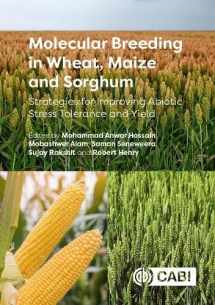
Molecular Breeding in Wheat, Maize and Sorghum: Strategies for Improving Abiotic Stress Tolerance and Yield
Book details
Summary
Description
The global population is projected to reach almost 10 billion by 2050, and food and feed production will need to increase by 70%. Wheat, maize and sorghum are three key cereals which provide nutrition for the majority of the world's population. Their production is affected by various abiotic stresses which cause significant yield losses. The effects of climate change also increase the frequency and severity of such abiotic stresses.
Molecular breeding technologies offer real hope for improving crop yields. Although significant progress has been made over the last few years, there is still a need to bridge the large gap between yields in the most favorable and most stressful conditions. This book:
- Provides a valuable resource for wheat, maize and sorghum scientists working on breeding and molecular biology, physiology and biotechnology.
- Presents the latest in-depth research in the area of abiotic stress tolerance and yield improvements.
- Contains the necessary information to allow plant breeders to apply this research to effectively breed new varieties of these crops.
It provides a consolidated reference for plant breeders and crop scientists working on the challenges of enhanced crop productivity and climate change adaptability.


We would LOVE it if you could help us and other readers by reviewing the book
Book review



